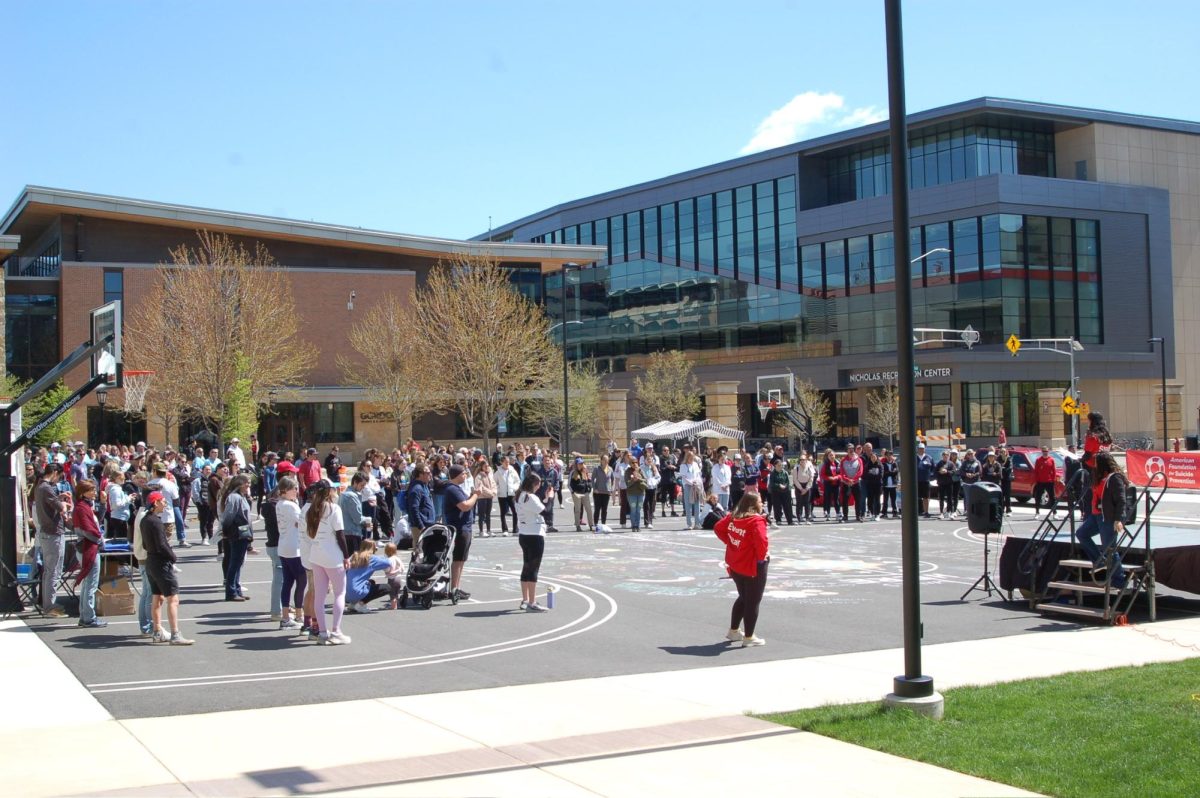Content Warning: Discussion of suicide and/or self-harm. If you are experiencing thoughts of suicide or self-harm, dial 988 to reach the Suicide & Crisis Lifeline. View options for mental health services on campus through University Health Services.
University of Wisconsin freshman Brooke Brennan has been a leader in suicide prevention awareness efforts throughout her communities since her high school days.
As a student and hockey player at Hayward High School, Brennan helped organize an event called “Paint the Rink Yellow,” a hockey tournament fundraiser for Sophie’s Squad, a nonprofit organization providing education and awareness to improve athlete mental health. Brennan said around 500 donated t-shirts were sold one year to raise money.
“It was so cool to see everybody in school and everybody in the ring, even the opposing teams, wearing our shirts and spreading the message,” Brennan said.
With an interest in remaining involved in prevention and awareness efforts during her first year on the UW campus, this semester, Brennan met Hailey Shevitz, who chairs Madison’s annual Out of the Darkness Walk with the American Foundation for Suicide Prevention.
After the two spoke, Brennan, whose mother died by suicide when she was eight, decided she wanted to share her story in a speech at this year’s walk. This includes breaking a stigma surrounding those closest to her.
Growing up, she was told to say her mother passed away in a car accident because some people feel shame around losing a family member to suicide, which they shouldn’t, she said. She hopes that by sharing this story at the walk, she will both honor her mother’s legacy and continue to break the stigma.
Every year, hundreds of students and members of the Madison community come together in April for the walk. This year’s walk will be held April 12, beginning at 11 a.m. The two-mile route starts and ends at the Sellery Basketball Courts.
The Madison walk is one of the most popular across the country. Shevitz said it raised about $48,000 last year, the second largest amount of funds raised from any walk. Around 300 walkers participated.
Individuals are always welcome, but groups are encouraged to sign up for the walk in fundraising ‘teams.’ The biggest fundraisers are generally teams consisting of families who have lost a loved one to suicide.

The Sarah Shulze Foundation, an organization founded in honor of UW runner Sarah Shulze, who died by suicide in 2022, is the largest group regularly participating in the event. The Shulze family travels from California to attend, Shevitz said.
Shevitz’s cousin Matthew, who died by suicide when Shevitz was 16, has a team established in his memory as well.
Anyone is welcome to attend the walk, and registration is available online at no cost. Walkers are encouraged to donate to the event to help it reach its fundraising goal of $50,000. The money is used to support AFSP’s suicide prevention and awareness efforts, including advocacy and trainings help by the organization’s UW chapter.
It is Shevitz’s second year organizing the event, which will include performances from a cappella groups Redefined and Tangled Up in Blue in addition to Brennan’s speech.
Before arriving at UW, Shevitz had participated in the walk in her hometown of Pittsburgh — the Madison walk is one of over 400 every year across the country.
Volunteering at the Madison walk as a freshman in 2023, Shevitz was inspired by the walk’s tradition of using honor beads, or beaded necklaces participants wear to represent different levels of loss they have experienced using different colors — like losing a child, spouse, parent or friend — making it simpler to understand each other’s connection to the cause without having to say anything.
“It’s shouldering the loss as a group,” Shevitz said.
The walk and the beads aim to both honor those lost and show those impacted by suicide that they are not alone, Shevitz added. Hence its name, the event brings together those affected by suicide — the darkness. Everybody walks out of it together.
Last year, Shevitz went into the walk expecting it to be somber. Instead, the day was filled with hope and joy, complete with a mood-boosting playlist, she said.
“It’s a fun event,” Shevitz said. “It’s not dark and scary.”
Brennan said those impacted by suicide often lack something to look forward to or a community to surround themselves with, both of which the walk seeks to provide.
She added that she and other event organizers want to be a light in the world for those who feel shrouded in darkness. For those feeling alone, the walk is a physical representation of the community there to support them.
“When you’re at your lowest moment, it doesn’t seem like there is that light at the end of the tunnel,” Brennan said. “This may seem like the end of your story, but it’s not because there’s so much more that you have yet to experience.”
Resources regarding suicide prevention and mental health:
- 988 Suicide & Crisis Lifeline: 988 https://988lifeline.org/help-yourself/loss-survivors/
- Crisis Text line: Text HOME to 741741 https://www.crisistextline.org/
- Trevor Lifeline crisis intervention and suicide prevention services to lesbian, gay, bisexual, transgender, queer and questioning (LGBTQ+) young people: https://www.thetrevorproject.org/get-help/
- UHS 24/7 crisis support 608-265-5600 (option 9)
UHS suicide prevention resources: https://www.uhs.wisc.edu/prevention/suicide-prevention/



